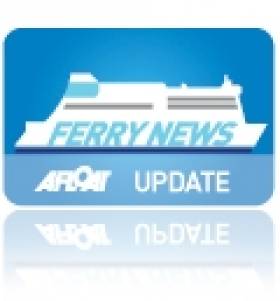Displaying items by tag: 'Green'Spain
‘Proposed’ Cork-Spain Route Remains Under Review
In addition to services running out of Rosslare operated by Celtic Link Ferries and Irish Ferries and the alternative option of landbridge connections to Europe via the UK.
In the meantime, the Port of Cork will continue to be in dialogue with potential operators and investor's, however in the current climate it is proving more challenging to establish the service. Yet both the port authorities in Cork and Gijon remain committed in establishing the first direct Irish-Iberia passenger ferry route, with an update on the Spanish service due in early June.
Since 2008 the port authorities of Cork and Gijón, through the Promotion of Short Sea Shipping and Co-Operation with Small Medium Enterprise's (Proppose) an EU Inter-Reg project, have conducted feasibility studies into the service.
Interest in the service to date, has shown interest from Brittany Ferries, P&O Ferries and Transfennica, a Scandinavian based operator. It was envisaged that a ro-pax type of vessel would operate the 24-hour route to Gijón in Asturias, the region which forms part of Spain's northern 'Green' coast.
The route across the Bay of Biscay would be an attraction to freight hauliers, saving mileage and reduced fuel costs in addition avoiding a weekend ban to trucks travelling through France.
Last summer the ro-pax Norman Bridge started a new route between Nantes / St. Nazaire (Montoir-de-Bretagne) and Gijón, operated by GLD Atlantique. This route received support through the EU 'Motorways of the Seas' (MOS) programme to divert vehicle traffic from congested road-infrastructure and transferred to designated shipping routes, using larger and faster ro-pax vessels.
The route's opening was marked with a declaration signed by Dominique Bussereau, the French Minister of State responsible for Transport and his Spanish counterpart Magdalena Alvarez of the first of two Franco-Spanish MOS concept routes, starting with the 14-hour GLD Atlantique service.
- Irish Ferries
- port of Cork
- Celtic Link Ferries
- Fastnet Line
- P&O Ferries
- Brittany Ferries
- Ports and Shipping News
- Cork Harbour News
- RoPax
- Port of Gijón
- Proppose
- Motorways of the Seas
- MOS
- Transfennica
- CorkGijón
- Asturias
- 'Green'Spain
- Landbridge
- NantesSt.Nazaire
- GLD Atlantique
- Norman Bridge
- Cork Harbour





























































